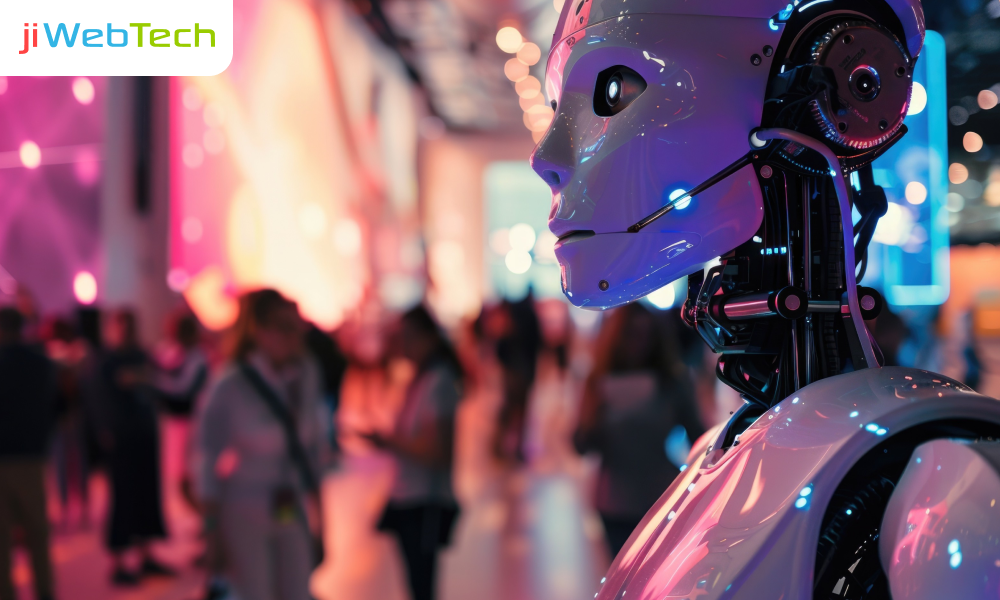- Jan 08, 2026
- Enterprise
- 920
Share this post on:

The event management industry has undergone a significant transformation in recent years, thanks to the adoption of Artificial Intelligence (AI). Traditionally, event planning and execution have involved numerous manual processes, complex logistics, and time-consuming tasks. However, AI-based solutions are now revolutionizing event management by automating repetitive tasks, enhancing personalization, improving operational efficiency, and delivering superior attendee experiences. This blog explores the multifaceted ways AI streamlines event management and why it is becoming an indispensable tool for event organizers worldwide.
Key Takeaways
- AI is revolutionizing event management by automating manual tasks and improving overall efficiency.
- Personalized attendee experiences powered by AI boost engagement and satisfaction.
- Real-time analytics and insights help organizers make smarter, data-driven decisions.
- AI-based solutions reduce costs and enhance scalability for events of all sizes.
- The future of event management lies in AI integration, enabling smarter planning, seamless execution, and measurable growth for every event
Transforming the Event Lifecycle with AI
AI integration spans the entire event lifecycle - from the earliest planning stages to real-time event management and post-event analytics. By embedding AI into each phase, organizers benefit from improved efficiency and innovation.
Pre-Event Planning:
One of the most crucial stages AI impacts is pre-event planning. AI-powered tools analyze vast datasets to recommend ideal venues based on factors like capacity, location, budget, and historical event success. This reduces costly guesswork and ensures better resource allocation. Marketing efforts become highly targeted and personalized using AI-driven audience segmentation. Machine learning models analyze demographics and behavior patterns to create tailored campaigns that boost invitation acceptance and registration rates. AI automates email sequencing, social media advertising, and content creation, significantly saving time while delivering engaging personalized messaging.
Intelligent Attendee Engagement:
Enhancing attendee experience is a prime focus of AI in event management. AI-powered chatbots and virtual assistants provide real-time, 24/7 support for attendees, answering FAQs about schedules, venue access, and event logistics. This instant communication reduces the demand for on-site staff and significantly improves attendee satisfaction. Through AI-enabled recommendation engines, participants receive personalized session suggestions, networking opportunities with like-minded individuals, and customized itineraries. These personalized experiences encourage active engagement and meaningful interactions during the event.
On-Site Event Efficiency:
AI’s real-time capabilities optimize many operational aspects during the event. Facial recognition technology accelerates check-in processes, enabling swift, contactless admission while enhancing security. AI-driven analytics monitor crowd flow, helping organizers manage space utilization and avoid bottlenecks.
Post-Event Analysis and Follow-Up:
After the event, AI analyzes massive datasets gathered from attendee behavior, feedback, and engagement metrics to draw insightful conclusions. Predictive analytics help forecast trends and inform strategies for future events. Organizers gain a clearer understanding of what worked well and areas needing improvement, leading to increased return on investment (ROI) in subsequent events.
Benefits of AI in Event Management
The integration of Artificial Intelligence in event management delivers a wide range of benefits that revolutionize how events are planned, executed, and analyzed. Organizations adopting AI-based solutions experience transformative advantages that enhance efficiency, reduce costs, and deliver superior experiences to attendees and stakeholders. Here are the expanded key benefits of AI in event management:
1. Increased Operational Efficiency:
AI automates many repetitive and time-consuming tasks such as attendee registration, invitation tracking, follow-up communications, and scheduling. This automation greatly reduces manual labor, minimizes human error, and accelerates workflows. Event planners can handle multiple events simultaneously with the same team size, freeing up valuable time to focus on strategic and creative tasks. AI-enabled dashboards provide real-time visibility into event progress, task completion, and potential bottlenecks, ensuring nothing falls through the cracks.
2. Significant Cost Savings:
By automating administrative and logistical functions, AI reduces labor costs and operational inefficiencies. Early identification of resource conflicts—such as double-booking equipment or vendors—and proactive resolution prevent costly last-minute disruptions. Predictive analytics optimize budget allocation and vendor management, helping planners avoid overspending while ensuring quality execution. Overall, AI maximizes the return on investment for event organizers.
3. Enhanced Personalization:
AI deeply personalizes the attendee experience through intelligent data analysis. Recommendation engines suggest relevant sessions, exhibitors, networking opportunities, and activities based on participant profiles and past behaviors. Chatbots provide instant, 24/7 support, answering attendees queries on schedules, venue logistics, and event updates. These personalized interactions increase attendee satisfaction, engagement, and loyalty by making participants feel truly valued and understood.
4. Improved Vendor Coordination:
AI streamlines communication and coordination across all event stakeholders, including guests, vendors, sponsors, and internal teams. Automated RSVP tracking and multi-channel communication management ensure accurate guest lists and seamless information flow. Vendor contracts, timelines, and requirements are monitored and managed automatically, reducing back-and-forth emails and improving reliability. This comprehensive coordination prevents errors and delays, helping events run smoothly.
5. Resource Management:
AI assists with detailed logistics planning such as creating and monitoring timelines, tracking equipment and inventory, and managing transportation. Dynamic scheduling tools adjust plans in real-time based on evolving conditions and attendee feedback. AI also helps generate packing lists and gift selections based on preferences, optimizing the logistical workload. Using AI for logistics management ensures events adhere to tight deadlines and budgets without sacrificing quality.
6. Data-Driven Decision Making:
One of AI’s strongest benefits is its ability to analyze vast amounts of historical and real-time data to generate actionable insights. Organizers gain predictive capabilities for attendance forecasting, session popularity, budget needs, and marketing effectiveness. Post-event analytics provide detailed reports on attendee satisfaction, engagement metrics, and ROI, informing continuous improvement. Real-time analytics during events empower quick, informed decisions that enhance event success.
7. Scalability and Flexibility:
AI systems scale effortlessly to handle events of any size or complexity—from intimate conferences to large multi-venue expos. They manage extensive data and stakeholder interactions without human resource increases. This scalability enables both small event teams and large organizations to deliver high-quality experiences consistently, adapting quickly to changing event demands.
8. Creative Support and Innovation:
Beyond administration, AI supports creative event elements by generating theme ideas, visual mood boards, décor suggestions, and entertainment options based on current trends and client preferences. This innovation assists event designers and planners in developing unique, memorable event experiences while optimizing budget constraints.
9. Enhanced Security and Compliance:
AI-powered technologies like facial recognition and behavioral analytics enhance event security by streamlining participant verification and identifying potential risks in real-time. Automated compliance checks ensure vendor contracts, attendee data handling, and event operations adhere to legal and organizational policies, reducing liability.
10. Seamless Communication:
AI platforms centralize communication across planning teams, vendors, sponsors, and attendees. Automated updates and reminders keep everyone aligned, improving collaboration and reducing misunderstandings or miscommunications. This creates a cohesive environment where all stakeholders work efficiently towards shared event goals.
Steps to Develop an AI-based Solution
Artificial Intelligence (AI) continues to revolutionize industries globally, promising smarter automation, improved decision-making, and innovative customer experiences. Developing an AI-based solution, however, requires careful planning, the right technology stack, and a clear understanding of business needs. Whether it’s a customer service chatbot, predictive analytics tool, or autonomous system, following a structured approach is vital for success.
1. Define the Business Problem and Objectives
Successful AI projects start with clear problem definition and goal setting. Identify the specific business challenges that AI can solve—whether it’s automating a workflow, enhancing customer engagement, or optimizing operations.
- What problem do you want to solve?
- What are the desired outcomes?
- How will success be measured? (e.g., accuracy, time savings, revenue growth)
Clear objectives align stakeholders and guide technical development, preventing scope creep and ensuring ROI focus.
2. Conduct Data Strategy and Preparation
AI relies on data. The quality, quantity, and relevance of data directly impact the performance of AI models.
- Inventory existing data sources and identify any gaps.
- Collect additional data if necessary, including synthetic or third-party datasets.
- Clean, normalize, and label data to ensure accuracy.
- Establish data governance policies to ensure privacy and compliance.
Data preparation is often the most time-consuming phase, but it is critical for effective AI training and deployment.
3. Choose the AI Technology Stack
Select the right tools, frameworks, and platforms that fit your solution’s technical requirements and your team’s expertise.
- Popular machine learning frameworks: TensorFlow, PyTorch
- Natural language processing: OpenAI APIs, spaCy, NLTK
- Computer vision: OpenCV, YOLO
- Cloud hosting and AI platforms: AWS AI, Azure Cognitive Services, Google Cloud AI
- MLOps tools for deployment, monitoring, and lifecycle management
Aligning the technology stack with organizational infrastructure ensures smooth integration and scalability.
4. Build and Train AI Models
This is the core AI development phase where algorithms learn from data.
- Select appropriate algorithm types based on your problem (classification, regression, clustering, NLP, etc.).
- Train models using the prepared datasets.
- Optimize models by tuning hyperparameters and performing feature engineering.
- Iterate through multiple training cycles to improve accuracy and reduce bias.
It’s essential to document training processes and maintain model version control for reproducibility and auditability.
5. Develop AI Applications and Integration
Once the AI models perform well, integrate them into usable applications.
- Develop APIs to connect AI models with existing business systems.
- Build user interfaces (mobile, web) that allow end-users to interact with AI features intuitively.
- Ensure security, privacy, and compliance layers are in place.
This step transforms AI from concept to operational capability.
6. Test, Validate, and Deploy
Thoroughly test AI solutions to verify accuracy, reliability, and scalability.
- Use separate validation datasets to avoid overfitting.
- Conduct stress testing and edge case evaluations.
- Check for fairness and bias to ensure ethical AI use.
- Deploy models incrementally (canary or blue-green deployment) for risk mitigation.
- Implement monitoring dashboards to track model performance and detect drift or anomalies in production.
Effective deployment strategies reduce downtime and improve user trust.
7. Monitor, Maintain, and Continuously Improve
Post-deployment, maintain AI models to adapt to new data and evolving business conditions.
- Monitor for model drift and accuracy degradation.
- Retrain models regularly with updated data.
- Incorporate user feedback for refinement.
- Scale system capabilities to handle increased loads or complexity.
Continual improvement ensures the AI remains relevant and effective long-term.
Cost to Develop an AI-based Solution
Here is a detailed cost breakdown for developing AI-based solutions in 2026, presented in a table format for clarity:
Basic AI Solutions | $5,000 – $50,000 | Includes simple rule-based chatbots, form auto-fill, AI FAQ assistants, basic predictive analytics. Ideal for small projects or PoCs. |
AI Chatbot Development | $10,000 – $60,000 | Costs depend on complexity: simple chatbots at lower end; advanced NLP-based chatbots at higher end. |
AI App Development | $20,000 – $100,000+ | Basic AI-powered apps start here; advanced apps with custom models and integrations can be costlier. |
AI Agent & Personal Assistant | $40,000 – $150,000+ | Custom AI agents that learn and perform tasks across systems, requiring sophisticated development. |
Advanced AI Solutions | $50,000 – $400,000 | Includes computer vision, risk management systems, workflow automation, and personalized learning platforms. |
Full-Scale / Enterprise AI | $300,000 – $1,000,000+ | Large-scale, complex solutions with cutting-edge AI, extensive data needs, compliance, and real-time operations. |
Ongoing Maintenance & Updates | 15% – 25% of initial development annually | Covers model retraining, monitoring, feature updates, and performance optimization post-launch. |
Why Choose jiWebTech as Your Event Management Software Development Company
Selecting the right technology partner can make a big difference in the success of your event management software. Here’s why jiWebTech is the ideal choice for building your next AI-powered event management solution:
Expertise in AI and Automation
Our team at jiWebTech specializes in integrating Artificial Intelligence, IoT, and automation technologies to create powerful and intelligent event management platforms.
Customized Software Solutions
We don’t believe in one-size-fits-all. Every solution is tailored to match your business needs—whether you’re managing corporate conferences, trade shows, or virtual events.
Seamless Event Operations
From registration and scheduling to live tracking and analytics, our software automates every step, ensuring smooth event execution and enhanced attendee experiences.
Data-Driven Insights
Our AI-enabled systems collect and analyze real-time data to give you actionable insights—helping you make smarter decisions for future events and maximize ROI.
Enhanced Security & Scalability
We prioritize data security and build solutions that can scale effortlessly to handle events of any size or complexity.
User-Friendly Interfaces
Designed with simplicity in mind, our intuitive dashboards and interfaces make event management easier for both organizers and attendees.
End-to-End Support
From concept to deployment—and even post-launch maintenance—our experts work closely with you to ensure flawless execution and continuous improvement.
Proven Industry Experience
With years of experience in event management software development, jiWebTech has helped numerous organizations digitalize their events efficiently and successfully.
Conclusion
Artificial Intelligence has become the driving force behind the modernization of event management. From simplifying planning and automating routine tasks to delivering hyper-personalized experiences and insightful analytics, AI transforms how events are organized and experienced.
As the demand for smarter, data-driven solutions continues to rise, businesses must leverage AI to stay competitive and efficient. By adopting AI-based event management solutions, organizations can boost productivity, enhance engagement, and achieve measurable growth.
Contact us to ensures that you get customized, scalable, and future-ready software that perfectly aligns with your event goals. The future of event management is intelligent- and jiWebTech is here to help you lead that change.
Frequently Asked Questions (FAQs)
1. How does AI improve event planning efficiency?
AI automates routine tasks such as scheduling, registration, reminders, and venue selection, significantly reducing manual effort and speeding up the planning process.
2. Can AI personalize the experience for event attendees?
Yes, AI uses machine learning algorithms to analyze attendee preferences and behavior, offering personalized session recommendations, customized agendas, and targeted communications.
3. What role do AI chatbots play in events?
AI chatbots provide instant, 24/7 attendee support by answering frequently asked questions, guiding through registration, and offering event information, reducing the workload on event staff.
4. How does AI help with post-event analysis?
AI analyzes feedback and engagement data to identify trends, attendee satisfaction levels, and areas for improvement, informing better strategies for future events.
5. Is AI suitable for both small and large-scale events?
Yes, AI solutions scale seamlessly to manage the complexity and size of any event, from small conferences to large multi-venue exhibitions.
6. What are some challenges of using AI in event management?
Challenges include the need for human review of AI outputs to ensure quality and alignment, data privacy concerns, and the initial cost of AI integration.
7. How does AI contribute to cost savings in event management?
By automating tasks, optimizing resource allocation, and reducing errors, AI reduces labor costs and operational expenses, improving overall event profitability.









